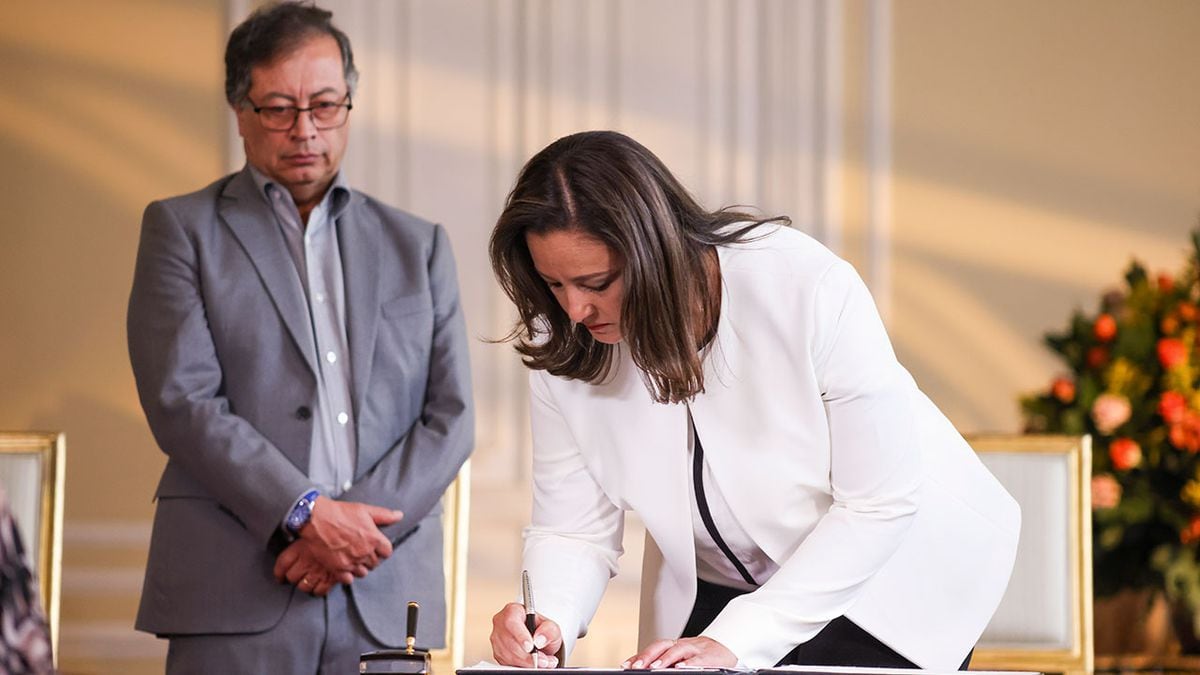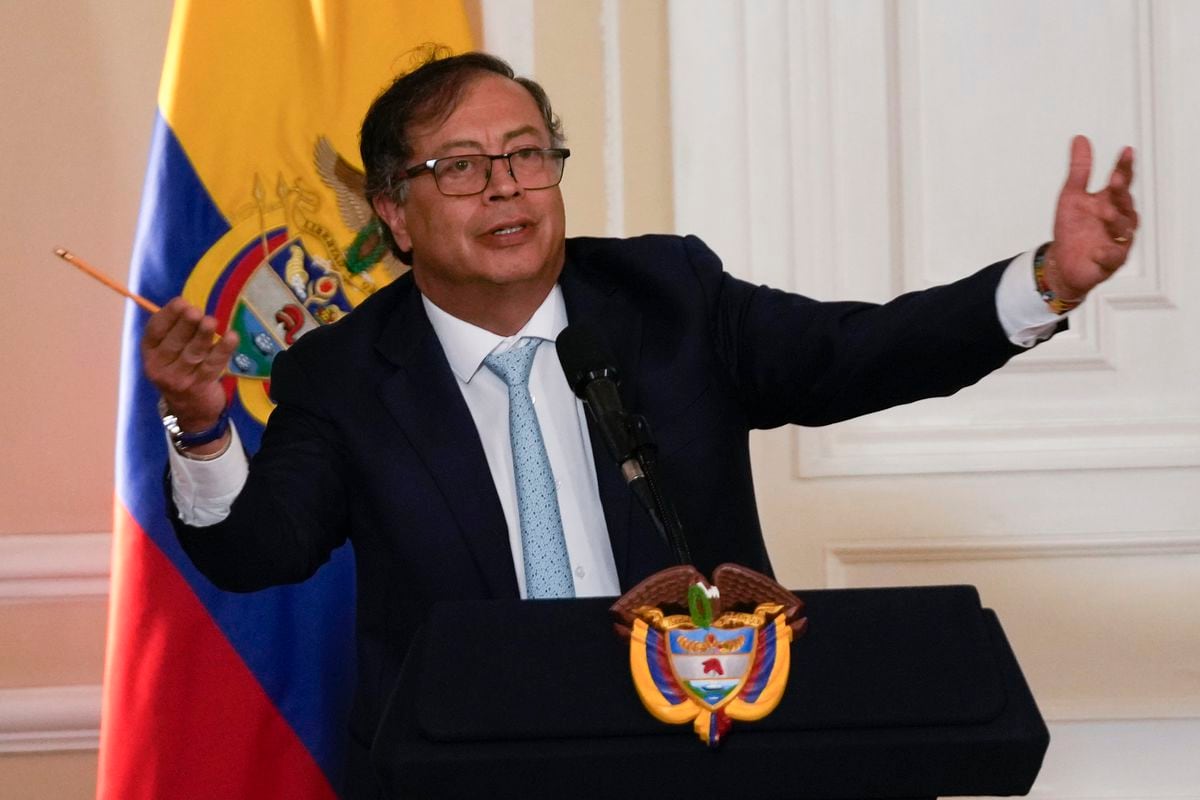This is the story of a young woman who didn't know what to do with her life and a man who did too many things. Fate brought them together in an adventure of those that only happen once. A history of hierarchies, power and ambition that has made the Government of Colombia itself tremble. This is the short story of Armando Benedetti and Laura Sarabia, a binomial that won the heart of Gustavo Petro in the campaign and that has now caused a fire in the Palace.
Sarabia is a young woman who has been unemployed for eight years. He is 21, he does not know what direction to take in life. Uncertainty has plunged her into a dark pit. She came from being one of those brilliant students who suddenly finds that nobody cares about your honors out there. Laura has failed the entrance tests of the armed forces and they have not wanted to renew her internship as an administrative in the Ministry of Defense. He almost lost faith. But he does not stop reading the Bible or attending the Christian Church. In the cult, a friend recommends that he go in search of work to the party of the U, that of the neat Juan Manuel Santos, then the president.
Sarabia enters as an intern and does not get paid. Of military training, she soon stands out for being orderly and conscientious. In a short time he was offered to work for Armando Benedetti, an intuitive, tongue-in-cheek, funny, explosive man, who had been president of Congress and of his own party. At that time he was already one of the best-known politicians in the country. Benedetti needs someone loyal and meticulous to organize his day to day. Sarabia thus discovers her vocation: to organize the lives of others. He is a parrandero, extroverted, excessive and, at the same time, a skillful and cunning politician. She, structured, early riser, exercises and has everything written down in an agenda. He finds good support, she a purpose in life.
Benedetti had been active in Uribismo, Santismo and now he is willing to catch the next wave that takes him to the shore. In a moment of clairvoyance, he leaves everything behind and joins the leader of the left Gustavo Petro. It's November 2020. He is sure that this clueless man is going to be the next president of Colombia and does not want to be left out. Petro had failed in his two previous attempts, but something tells Benedetti that his time has come. With him, of course, he takes Sarabia. Benedetti guides Petro around the country in search of votes, Laura organizes the trips, the agenda, the lunch, the hotel, the planes. It is a good time to mention that, in the midst of the frantic campaign, Benedetti's children are cared for by Marelbys Meza, a person who will enter the scene later.
One day, as they cross Colombia aboard the Super King Air 300, Benedetti looks at Petro, reclining to his right on a beige leather seat:
"The only way to prevent this man from being president of Colombia," he intones with a dramatic tone, "is to throw this plane away.
With that absolute conviction they head the presidential campaign. Benedetti and Petro believe themselves to be Batman and Robin in their fight against evil; that in this case, and always according to them, are the corrupt elites who have not allowed the country to prosper and whom Benedetti knows closely. Petro in these trips is theoretical, philosophical, has all the details of the country in mind. Benedetti is more concrete, realistic, grounded. And Sarabia acts as glue, which anchors them to the ground. The one who remembers to pay the company that sets the stage in a town lost to God.
She gets pregnant in the middle of the campaign, but that doesn't change anything. Keep doing everything over the phone. Sarabia works for Benedetti, but little by little he takes care of Petro more and more. If the candidate naps, she is the one who calls him to get up, brush his teeth and go to the next rally.
Laura Sarabia, 29, chief of staff to President Gustavo Petro, during an interview at the Nariño Palace, in Bogota, Colombia, on May 12, 2023.Santiago Mesa
When Petro wins the election, the trio they had formed seems destined to crack. The time of the dozens of advisers, the ministers, the bodyguards, the truculent life in the Palace begins. Benedetti wants a position close to the president, one that allows him to do something similar to what he did, guide Petro through the twists and turns of power. However, it drags several judicial processes that make the president doubt. He esteems him very much, but he thinks it is a risk to have him on the front line. So he decides to put him in a relevant position, that of ambassador to Venezuela. The first lady, Verónica Alcocer, also participates in that decision.
It is a way to have it close, but far away. Neither with him nor without him. A Solomonic decision. Benedetti takes it as an exile, but abides by it. Now he will be in charge of reestablishing relations with Chavismo and talking with Nicolás Maduro and Jorge Rodríguez. It's no small feat. Sarabia is convinced that she will follow Benedetti to Caracas, but Petro calls her to occupy the closest possible position, that of personal secretary. Benedetti, far away; Laura, nearby, in the office next door, ten steps from each other. The pupil has surpassed the mentor. His task is an extension of what he had done in the campaign. Getting a man out of bed who didn't get up early, driving a man who has no notion of time to appointments and then summarizing the news while he is engaged in some discussion on Twitter.
Benedetti never gets to like his place in the government he helped create. He, who wanted to be a minister, feels exiled in Caracas. Sarabia, on the other hand, expands his gap in the center of power. His name begins to sound at all hours, his body often appears in all the photos of the president as if it were his shadow. This young woman with no political past is beginning to attract the attention of some ministers. While they are forced to leave their phones out of the Councils, Sarabia types on his cell phone during meetings. Only she has that bull. He thus becomes the person closest to the president.
The government seems to roll only for the first few months. The novelty excites a good part of the country. But eventually the first crises arrive. Benedetti, who knows Congress well, where Petro's reforms are stalled, thinks he knows what the president needs to win votes and loyalties in other parties. He regularly calls Sarabia, with whom he has great confidence. It tells you that things are being done wrong. That also leads to stronger discussions and rising decibels.
One of the first cracks between them arises from the foreign minister, Alvaro Leyva, an 80-year-old man who wants to zealously control his space. He does not seem very happy that Benedetti is in charge of relations with Venezuela. Distrust him. The Foreign Ministry begins to look closely at the trips of the ambassador, who goes assiduously to Colombia. A deaf war begins that has lasted until the end. Sarabia asks Benedetti not to be absent so much from Caracas and he takes it badly, as if she had taken sides. With the weeks things are not fixed. Petro makes a surprise visit to Caracas to meet Maduro, but Benedetti is among the last to know. You are informed by third parties. He takes it personally, he finds it an insult. He believes Sarabia, who has worked with him for seven years, owes him some loyalty.
At the same time, reforms are stalled in Congress. Benedetti, one of those people who always have contacts everywhere, calls Sarabia and they discuss the way he is governing. The talks are acrimonious, although they usually end in reconciliation. One day they shout at each other, another they talk to each other in a loving way. On Mother's Day, Benedetti sends her flowers.
As the months go by, Benedetti begins to get impatient. He considers that he has already done everything he had to do in Venezuela, at least everything that can give him shine. Bilateral relations have been restored and Petro and Maduro have met several times. He wants to return to Bogotá as minister. Petro tries to find a place for him and offers him to be super minister, a figure that currently does not exist but had already been used in other governments. Benedetti loves the idea. I would discuss the details with Sarabia. Some versions contrast on this point. There are those who say that Sarabia does not want Benedetti to return because he fears that he will occupy his role; others that Sarabia agrees but that the president stops him.
The Great Scandal
Colombia lives those days pending another story of intrigue. Four indigenous children have survived a plane crash and are lost in the jungle. The country is waiting – they have not yet appeared – for a rescue with a happy ending. The disagreements between the two people closest to the president are still domestic material. But something begins to go wrong in the Palace. Like any suspense story, this one begins in droppers. Semana magazine, accustomed to capturing the attention of Saturdays with its covers, takes to its front page Marelbys Meza, the nanny who took care of the ambassador's children in the campaign. The headline reads: "I felt kidnapped."
Marelbys was now working caring for Sarabia's first child. From the Benedetti house she had been accused of a robbery, pointed out by a private polygraphist. La Mary, as they call her, was fired. Sarabia knew these facts, but he still hired her and history repeated itself. Cash disappeared from the apartment of the senior official in January. Sarabia reported to the Prosecutor's Office the theft of $ 7,000, but his security team subjected his environment to a polygraph at the Nariño Palace. The Mary stumbled in the same test, although it must be remembered that the reliability of these machines is doubtful. That's where she says she felt kidnapped and mistreated.
The country spends four days talking about Marelbys, Sarabia and the polygraph. Benedetti is on the sidelines until journalist Daniel Coronell puts him squarely in the plot. Before being on the cover of the magazine, La Mary made an amazing journey. Already farewell to Sarabia's house, Benedetti again entrusted her with the care of her children and took her to Caracas on a private flight to spend a week. Only they can know what they talked about at that time. The day the two returned to Colombia, the nanny stood in front of Semana's cameras around the presidential palace. Angered by the new information that implicates him, Benedetti denies having anything to do with that matter, he says that Meza did it on his own initiative. Then he drops the bomb that will end with the departure of both from the Government.
Last Wednesday, the politician posted an incendiary Twitter thread. In it, he says that Sarabia asked him for help to stop the publication of the interview and says that the official feared that it would be known that there was cash in her house. She also slips that she would have tapped the nanny's phone. From polygraph to illegal wiretapping.
President Gustavo Petro, with his chief of staff, Laura Sarabia, at the meeting with the delegation of U.S. congressmen led by Democrat Bob Mendez, on Tuesday in Bogota.
The veiled denunciation falls like an angel fallen from heaven in a Prosecutor's Office always on the lookout for the president. Prosecutor Francisco Barbosa, proposed by the previous administration, always seems ready to give his last blows in his post in a big way. His opposition to Petro is total and he enters this case as if he had just discovered Watergate.
The day after the ambassador's tweets there is an awkward silence in the government. Petro, recently arrived from Brazil, was supposed to meet with Sarabia and Benedetti to try to stop that chaos, but hours pass and nobody knows anything about the president. Barbosa fills the void with a press conference in which he says things like tapped the nanny's phone is the worst case against human rights that has occurred in Colombia in years. At times, he even escapes laughter. He promises to go all the way in his investigation and call Sarabia and Benedetti to testify. The situation is untenable for the president. That Thursday night the three of them meet, as they had done so many other times, but now the tension is cut. In those hours tears and screams are heard.
Petro appears publicly on Friday at a military event, possibly the most watched army promotions in history. He spends some time talking about himself when he releases the verdict: "While it is investigated, my beloved and esteemed official and the ambassador of Venezuela are withdrawing from the Government." The power triangle is broken. Petro dedicates words of affection to Laura; Armando doesn't even mention it. The two go home and the president is left alone. Those who have been close say that unlike other governments, in the Petro government almost never sees or hears anyone in the corridors of the Palace. The president has lost a lot in these six days. From the outset, look for someone who knows how to organize your life.
Subscribe here to the newsletter of EL PAÍS about Colombia and receive all the informative keys of the current situation of the country





/cloudfront-eu-central-1.images.arcpublishing.com/prisa/EFRVA77BGRH2ZPU376CHIPIX3I.jpg)

/cloudfront-eu-central-1.images.arcpublishing.com/prisa/RYAE4R2YX5G7LGEJQ74SXZI47A.jpg)

/cloudfront-eu-central-1.images.arcpublishing.com/prisa/PGFLWZYGBFG7FBITHUY7ILSNBQ.jpg)





